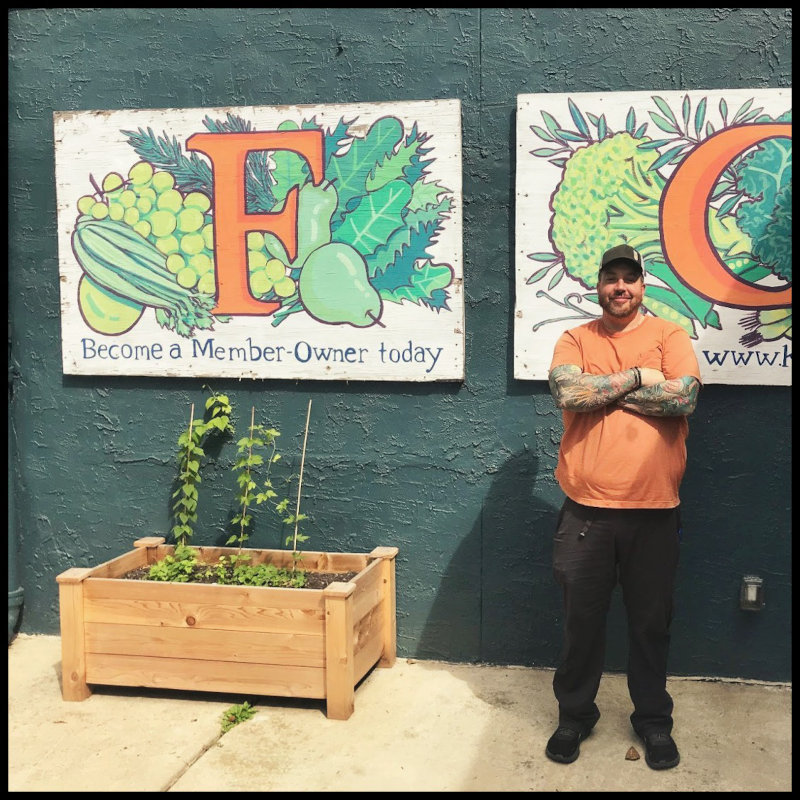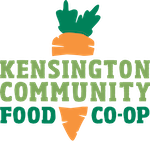
Kensington Grows, Cooks, & Blogs: An Interview with Mike Richards of The Kensington Community Food Co-op
Interfaith Philadelphia launched the Crafting Community Project in Kensington in Fall 2020. Through this neighborhood-rooted art and education initiative, we collaborated with organizations, faith communities, and neighbors to launch the Kensington Grows, Cooks, and Serves, a multi-part series exploring the intersections of food, faith, and culture within the Kensington area. One component of this initiative is a blog interview series highlighting Kensington-based restaurants and grocers who demonstrate understanding, community-centeredness, and the celebration of diversity. This week we sat down with Mike Richards, the General Manager of The Kensington Community Food Co-Op (KCFC).
Tell us a little about your business. (Where are you located? When did you open? What do you serve/sell?)
I’ve been with the co-op for the last four years. Kensington Community Food Co-op has been in this physical space (Coral Street and Lehigh Avenue) for a little over two years; it opened in April 2019. But the project itself has been going on since 2009, as a bunch of community members coming together to have a say and access to healthy food in the neighborhood. It then grew into this idea of a food co-op.
The difference between a food cooperative and other co-ops is this happens to be a consumer-owned co-op, meaning there are members-owners that shop here and help with business decision-making. It is a member-owned community grocery store. We have almost 1,500 members, which is very exciting.
We focus on selling local produce and products to support local businesses in any way that we can. So, we carry a larger percentage of local food; certainly local produce when it is in season. But we also try to carry some staple items and groceries. The emphasis is on working with a lot of local vendors and with farms in Lancaster. Even the construction on our building was done by a local construction group.
What inspired you to get involved with this business? For example, did you grow up eating this type of food at home and decide to share it with the community?
I’ve been in the food business for about 25 years. I worked at Whole Foods for a long time, even back when it was Fresh Fields. I moved from Whole Foods into the co-op movement about 10 years ago. I think what inspires me about food co-ops is that, unlike most other businesses that talk about local products as a buzzword, we really work within the neighborhood. It is not a bottom-line driven business. The money goes back into the business, whether it be physical improvements for the building, towards the staff for higher wages, training for staff, and development. Or, it gets paid back out to the members of the co-op. So, we’re not here to generate money, the money stays in the neighborhood and gets reinvested into the neighborhood.
Also, we work with a lot of smaller businesses: new, local startup businesses. The sense of community among these small businesses is what I appreciate most about working here; people that are invested in this local process. There are people who have been members since 2011 that stuck with KCFC as it came into a physical space over the past 10 years. These community members have invested in seeing this co-op go from this idea of like, “Hey, what if we started a grocery store,” to an actual store.
So, two years ago, when the store was struggling at the start of the pandemic, we weren’t sure if we were going to make it. But the community came together and rallied around the grocery store. You only see that level of support in businesses that provide fresh foods and work on such a local level.
Membership at the co-op is around $300, and many people ask, “What is the benefit of membership?” The benefit is the investment in a business in your neighborhood that is, in turn, investing in the neighborhood. This investment in the community is the biggest member benefit. I’m excited to be a part of that. It’s been tough, but it feels great and I wouldn’t do it any other way.
What values are important to you and your business?
I would say: honesty, integrity, and transparency. I think we try to be transparent and honest with where our products come from and the workings of our co-op with the staff, community, and member-owners. That is the biggest thing.
In what way does your business help foster understanding and promote community relationships?
Through the process of building this business from the ground up, we have to be involved with the community. This includes getting involved with council members and other businesses that are invested in the neighborhood. The sheer number of people we have met that live and work in the community that want to understand our business and support us is great.
Like I said, we partner with local businesses. Our Shop Local program gives members of the co-op discounts at other small businesses in the area. During the pandemic, when gyms and other small studios could not operate, we opened up our parking lot and outdoor patio to DanceFit and yoga studios and allowed those businesses to come here, free of charge, to continue operating their business. We are all about helping to support the community and the small business network.
What is your favorite item on your menu or in your stock?
Right now, my favorite item is the Dang! Mini Rice Cracker. It is awesome-sort of like a cookie. The toasted coconut variety is in stock right now, but the original is also really good.
What food or types of food are meaningful for you? Is that food connected to a faith, religious, or spiritual practice/value? If yes, how?
I certainly think there is a connection between people and food, even a spiritual one. For us at KCFC, the connection is really personal. We deal with vendors and farmers on a personal level. So, the biggest thing for me is the connection between an equitable source and offering those products and produce to the community.
For example, the small coffee houses we work with by providing ingredients, have their own circuit of fair-trade sources for their coffee beans. Both the coffee houses and our co-op are working to support those farmers on a global and local scale. An example of one of those coffee houses is Franny Lou’s – they’re great. They come and buy some of their food and produce from us. It’s interesting, I don’t live in the neighborhood, but I feel way more connected to this neighborhood than I do my own because of the connections with small businesses, neighbors, and co-op members.
Another great connection is the one between various food co-ops. We’re always communicating with other co-ops about collective purchasing and how it could help with accessibility and affordability of our markets. In terms of fair-trade, it is better for us to band together with other co-ops to purchase large quantities of produce and products to make it worthwhile for the farmers, while also making it more affordable for our members and customers.
For me, I love new foods. I love to cook and try new food. I have two kids, so I love to bring home new fruits and vegetables that they haven’t tried or seen before. It’s a fun way to get that connection with food.
Why do you believe that sharing food and eating together is an important practice? How is it related to sharing culture, faith, and community?
Everyone has their own recipes, their own ways of preparing food. It’s a great way for families to sit down together at a table and talk about their lives. But, it’s also a great place for friends to sit down and connect. Cooking food together, especially when it comes from a tradition that isn’t your own, can help you learn how delicious food can be and it gives you another way to appreciate culture.
Especially from folks coming into the co-op, we hear so many stories about different ways to prepare veggies, like sweet potatoes, and recipes that include some of our local products. When folks come in, they sometimes ask, “What do I do with this?” Like paw-paws. We have them right now and a lot of folks aren’t sure how to prepare them. It is sort of crazy to folks that this fruit is being reintroduced in a place that it is indigenous.
What do you love most about living/working in the neighborhood?
The thing I like most about the neighborhood is the sense of community. One of the things I like about the co-op and what it represents is the push for the community to become stronger and more sustainable. We don’t see that same thing in every neighborhood. Here, people are involved in neighborhood and zoning meetings. People are more engaged than in other places.
It is a lot easier to mobilize and engage the community with four walls and food on the shelves. Financing is hard for a community-owned business, so it takes a lot of perseverance to keep the business going. A big thank you goes to the community members that came together to bring this place into existence and keep this network of local food going.
If you’d like to know more about the Crafting Community Project or the Kensington Grows, Cooks, and Serves initiative, please reach out to Chelsea Jackson at [email protected].

